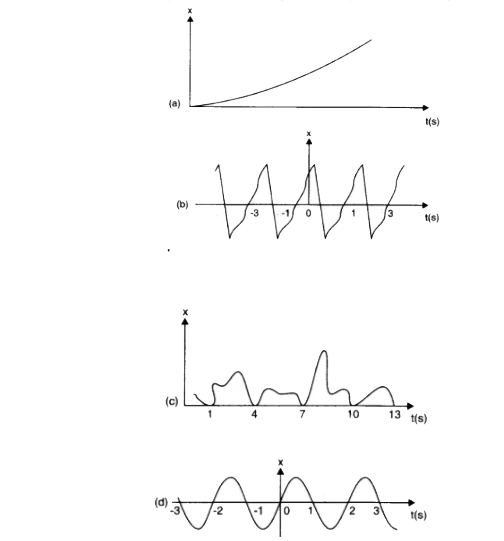Fig. 14.23 depicts four x-t plots for linear motion of a particle. Which of the plots represent periodic motion? What is the period of motion (in case of periodic motion) ?

Video Solution
Text Solution
(a) It is not periodic at all.
(b) It is periodic with a time period of 2 s
(c ) It is not periodic. Repetition of merely one portion is not enough for periodic motion. The entire motion during one period should be repeated successively.
(d) It is periodic with a period =2s.
|
Topper's Solved these Questions
- OSCILLATIONS Book:MODERN PUBLICATIONChapter:OSCILLATIONS Exercise:NCERT (Additional Exercises)
Explore 6 Videos
- OSCILLATIONS Book:MODERN PUBLICATIONChapter:OSCILLATIONS Exercise:NCERT Exemplar Problems Subjective Question (Multiple Choice Questions (Type-I))
Explore 11 Videos
- OSCILLATIONS Book:MODERN PUBLICATIONChapter:OSCILLATIONS Exercise:TOUGH & TRICKY PROBLEMS
Explore 9 Videos
- MOTION IN A STRAIGHT LINE Book:MODERN PUBLICATIONChapter:MOTION IN A STRAIGHT LINE Exercise:CHAPTER PRACTICE TEST
Explore 16 Videos
- PHYSICAL WORLD Book:MODERN PUBLICATIONChapter:PHYSICAL WORLD Exercise:Revision exercises (Long answer questions)
Explore 6 Videos
Similar Questions
Knowledge Check
Which of the following is a periodic motion ?
AA swimmer completing one trip from on bank of a river to the other and backBA hydrogen molecule rotating about its centre of mass.CAn arrow released from a bowDNone of these.Which one of the following is not a periodic motion?
ARotation of the earth about its axis.BA freely suspended bar magnet displaced from its N-S direction and released.CMotion of hands of a clock.DAn arrow released from a bow.Which one of the following is not a periodic motion ?
ARotation of the earth about its axisBA freely suspended bar' magnet displaced from its N-S direction and released,CMotion of hands of a clock,DAn arrow released from a bow
Which of the following are examples for periodic motion?
View SolutionGive two examples of periodic motion.
View SolutionGive two examples of periodic motion.
View SolutionWhich of the following examples represents periodic motion but not SHM?
View SolutionWhich of the following functions of time represent periodic motion ?
View Solution